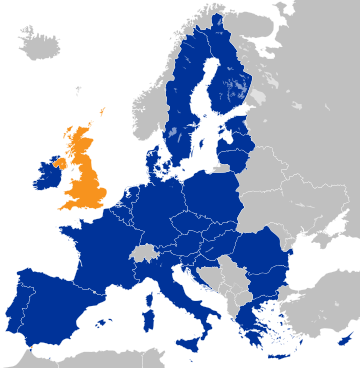The Talon’s Guide to Understanding the Brexit situation

These past few days, Brexit has become a universal conversation piece. Whether it’s being used by comedians to make jokes, reported on the news, or even talked about in the streets, everybody’s mind seems to be on Brexit, but what even is Brexit?
To understand Brexit, one must understand what the European Union (EU) is. Essentially, it is a political and economic partnership between 28 European countries. It began after World War Two as a way to prevent conflict, for the member states believed that countries who traded together were less likely to go to war. Currently, it has grown into a market that allows the free movement of services and goods between countries. You can think of it as though it were a single country: the EU has its own currency and parliament. However, Britain wants to separate from the EU for many reasons – the largest one being freedom.
If all goes according to plan, Britain will secede from the EU on the 29th of March. There will then be a transition period said to end in 2020, in which British MEPs (Members of the European Parliament) will leave the EU parliament.
The critical aspects of Brexit will occur after the transition period. The most crucial changes that would occur after the this phase would be in trade and migration between the UK and other European countries. Trade between all EU states (including the UK) was referred to as the EU single market. The system was created to ensure that trade agreements were fair and open, allowing members of the EU to trade freely amongst each other.. Being one of the biggest single market areas, the EU also allows for people, services and money to move freely – something very much enjoyed by national and international consumers.
So what could be the future for the UK? This is the question that has rendered people speechless. It is still unknown, but, as of now, it has been reduced to four options:
- No Deal
This would occur if an agreement is not met, leading Britain to crash out of the EU without a transition period. If this were to occur, she would have to use the Standard International Trading Rules, in which tax and border checks would start, and laws between the EU and Britain would separate. Although it is hard to pinpoint the immediate effects of this possibility, the worst case scenario would include chaos between Britain and the EU, an economic crash, huge delays at Britain’s border control, and shortages of food and medical supplies. Still, this could lead to a positive aspect – Britain would have complete control over its borders. Other than that, little to no politicians want the “no deal” to pass, as, according to them, little can be benefited from it.
- Hard Brexit
Many Conservative politicians and MPs want a “Hard Brexit” to pass. Hard Brexit makes it so the UK cuts off ties from EU powers entirely. Since Britain is part of the EU’s single market, customs union, and courts of justice, a hard Brexit would mean that Britain would no longer follow laws related to such entities. The reason hard Brexit is favored by Conservative politicians such as Jacob Rees-Mogg is that it would allow the British government to make its own laws, trade deals, and regulations. A hard Brexit would be good for businesses made in Britain because a company that relies on imports would get taxed and have to go through extra inspections at the British border. There is a lot of opposition for hard Brexit by Labour and Conservative MPs, and, seeing that the EU must agree upon it, the chances of a hard Brexit passing would be further complicated. Moreover, there will be a high demand for a hard border between Britain and the EU.
- Softer Brexit
This deal would create more alignment between the UK and the EU. If chosen, there will be very few changes. If the Brexit is soft enough, many things, such as the single market and customs union, will stay relatively the same. As for businesses, they would relatively stay the same. Businesses that rely on objects imported from other countries in the EU would be able to keep selling their product without extra taxes. This wouldn’t help British businesses since instead of the competition being wiped out, as it would in the case of a hard Brexit, it would stay the same. Also, there will be less demand for a hard border seeing as there would be little change, therefore allowing people to move freely. Although it may seem that a soft Brexit is the better option, there is opposition to it. Many Brits already desire a complete end to the EU’s control over the UK. Also, many think it would be a betrayal of the Brexit referendum, as well as a subversion of the UK’s national sovereignty.
- The Chequers Deal
This agreement was created by the British Prime Minister Theresa May. It was created to appeal to both sides (hard and soft Brexit). This agreement would mean that the UK would stay close to Europe (economically and politically). For trading rules, the government would sign a common rulebook with the EU, meaning that the trading rules would stay relatively the same. The government would also want more freedom to trade with whomever they like, such as other countries. May is hoping that if Britain continues using the EU’s trading system then the hard border can be avoided, hopefully hampering possible violence from Northern Ireland. Although this seems like the best of both worlds, the EU is not pleased with this deal. The chief negotiator of the EU, Michel Barnier, already dismissed this option, along with MPs on both sides having criticized it because it wouldn’t solve all issues currently revolving around Brexit.
Although there are only four options, each one is radically different from the next. Regardless of the decision, trade in Britain will hopefully continue to satisfy its citizens. In order for the country to be financially safe, it is of utmost importance that there isn’t an economic crash in the UK. With that, it is fundamental, with the deadline coming up very soon, to stay updated on the establishment of new resolutions as the new decision could not only affect the economy of Europe but the economy of the world as we know it.
Works Cited:
Hunt, Alex, and Brian Wheeler. “Brexit: All You Need to Know about the UK Leaving the EU.” BBC News, BBC, 31 Jan. 2019, www.bbc.com/news/uk-politics-32810887.
“Trade.” European Union, Publications Office of the European Union, 13 Nov. 2018, europa.eu/european-union/topics/trade_en.
News, Channel 4. “Brexit Explained: What Happens When the UK Leaves the EU?” YouTube, YouTube, 15 Sept. 2018, www.youtube.com/watch?v=7eoDwvl0QGk.

If for some reason you’re binge-reading all of The Talon’s bios, you may realize that most of the writers find creative and intuitive ways to introduce...









